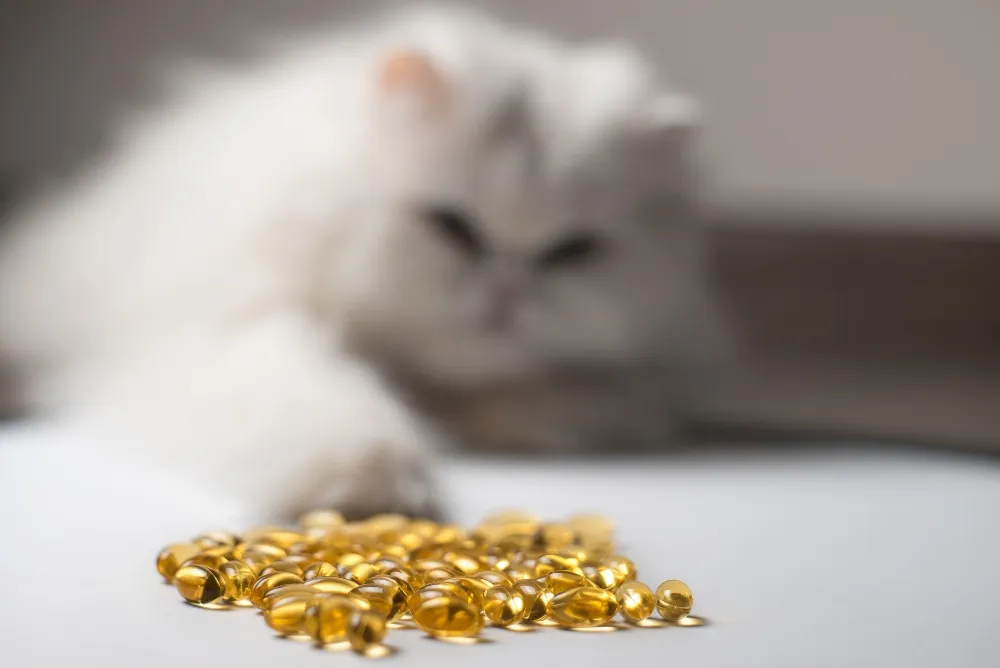Table of Contents
If you follow human or animal nutritional trends, you have probably seen an increasing amount of information about fish oil in recent years. Like many other nutritional supplements, fish oil is being discussed almost everywhere, with people touting its many benefits in both humans and animals.
When it comes to nutritional trends, though, it can often be difficult to separate fact from fiction and determine whether a product is truly beneficial. Fortunately, fish oil is one of a number of supplements that actually has scientific evidence to support its use in people and pets!
What is fish oil?
Fish oil is a nutritional supplement that is derived from the tissues of oily fish. Salmon is the most common source of fish oil, but other cold-water fish such as sardines, anchovies, and menhaden may also be used. This oil is removed from fish tissue during processing. It is then purified, and anti-oxidants are added as a preservative.
What are the benefits of fish oil for cats?
Fish oil contains high levels of two omega-3 fatty acids: eicosapentaenoic acid (EPA) and docosahexaenoic acid (DHA). Each of these omega-3 fatty acids has unique effects on the body, and can be used to treat a number of conditions.
The primary effect of EPA is to reduce inflammation in the body. Therefore, fish oil is often used to treat inflammatory conditions, such as skin allergies, osteoarthritis, and some types of heart disease. Additionally, EPA may be beneficial in the management of seizures and kidney disease.
DHA acts primarily on the nervous system. It plays an important role in promoting brain growth during kitten development, and can also help improve cognitive function in senior cats.
Are there any health risks associated with fish oil?
Some cats experience gastrointestinal effects, such as mild nausea or diarrhea, when taking a fish oil supplement. If this occurs, be sure your cat is taking their supplement with a full meal. Eating fish oil on an empty stomach may contribute to its gastrointestinal effects. Additionally, you may want to start with a lower dose, gradually working your way up to your cat’s recommended dose. This can allow your cat’s gastrointestinal tract time to gradually acclimate to the supplement.
Fish oil may cause your cat to take on a slightly fishy odor. An odor from the mouth or skin is not a problem for your cat, but it may take some getting used to on your part! Additionally, some cats develop an oily or flaky coat while taking fish oil supplements.
With excessively high doses of fish oil, serious side effects may occur. A high dose of fish oil may lead to pancreatitis, a potentially life-threatening condition associated with pancreatic inflammation. High doses of fish oil can also cause bleeding abnormalities, delayed wound healing, and heavy metal toxicity.
If your cat has a history of clotting disorders, pancreatitis, gastrointestinal disease, or diabetes, talk to your veterinarian before administering a fish oil supplement.
How much fish oil is safe to give my cat?
We don’t know the maximum safe dose for fish oil in cats. There has been considerable research on the use of fish oil in dogs, but fewer studies have been conducted on cats.
In order to minimize the risk of overdose, stick to products that have been recommended by your veterinarian. Be sure to follow the manufacturer’s label recommendations closely. More supplementation isn’t always better; exceeding the recommended dose can have potentially serious effects on your cat.
What form of fish oil is best for cats?
There are two forms of fish oil that are used in cats: liquids or capsules.
Liquid fish oil supplements often come in a bottle with a pump. The label instructions will tell you how many pumps of fish oil supplement to add to your cat’s diet on a daily basis. While liquid fish oil can be added to dry or canned food, it may be easier to mix with canned food.
Capsules be more convenient for some owners, but many cats are reluctant to swallow large capsules. Instead, you can cut a hole in the tip of the capsule, and the squeeze the liquid contents of the capsule and directly onto your cat’s food. Again, be sure to follow the label instructions.
It may take some trial and error to determine which form of fish oil your cat prefers.
Which fish oil is best?
Supplements are not regulated by the U.S. Food and Drug Administration in the same way that drugs are regulated. Therefore, there can be significant variation between brands. It’s important to be sure that you are purchasing a high-quality brand of fish oil, so you can ensure that your cat is receiving appropriate quantities of EPA and DHA.
Your best option is to purchase a fish oil supplement from your veterinarian, if possible. Many veterinary hospitals stock Eicosaderm®, Bayer FreeForm Snip Tips®, or other prescription-strength fish oil supplements. These supplements come from reputable veterinary drug manufacturers, providing a greater assurance of quality and safety.
If your veterinarian does not stock a prescription product, you may need to purchase an over-the-counter fish oil supplement. Talk to your veterinarian to determine which brand they recommend. Commonly-recommended brands include Nordic Naturals Omega-3 Pet® and Ascenta Feline Omega 3®.
Conclusion
Fish oil can have a number of benefits in cats, minimizing inflammatory conditions while contributing to brain development. The most common side effect associated with fish oil is mild nausea or diarrhea, but this can often be controlled by giving the supplement with food. If you wish to start your cat on a fish oil supplement, talk to your veterinarian to determine whether this supplement is safe for your cat and discuss brand recommendations.







